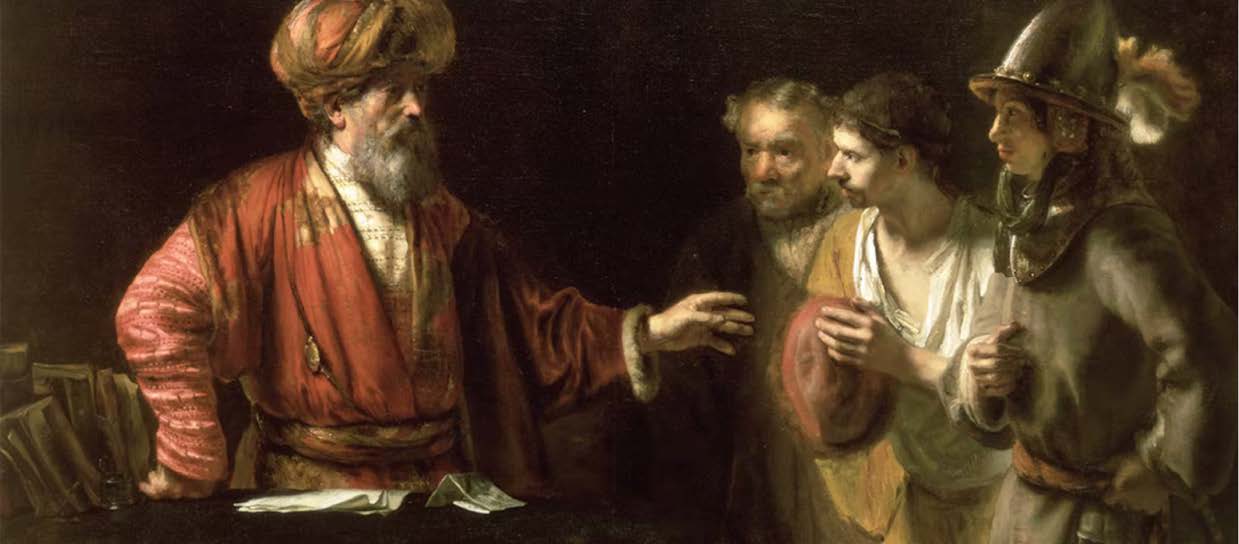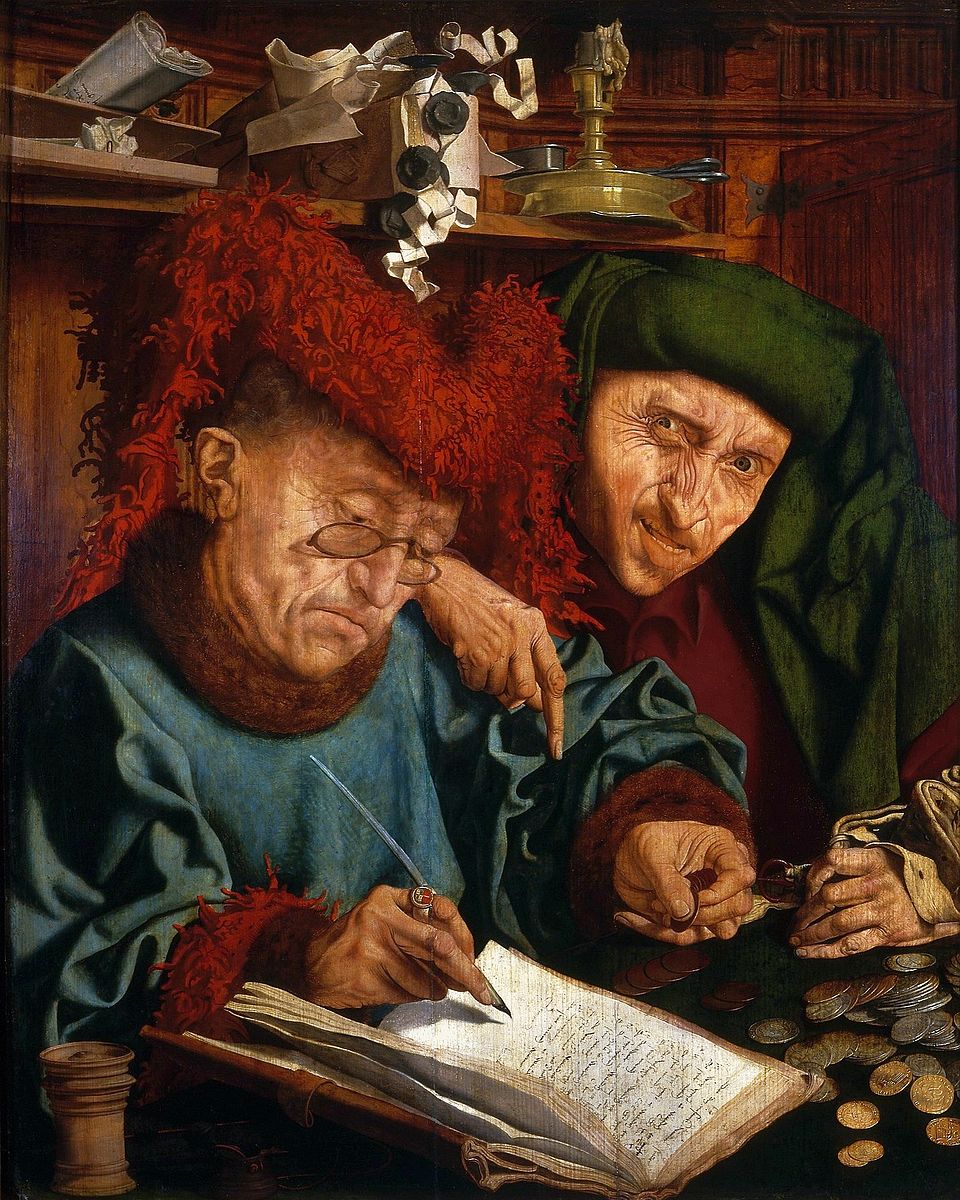by Eldon Heinrichs
I'VE BEEN CIRCLING around this parable for many weeks and each time I think I’ve got a handle on it, it slips out of my grasp. Every attempt at allegory fails to make sense, every attempt to find a moral centre breaks down. Even the commentaries disagree or seem unclear “We are hard-pressed to determine whether we should celebrate the stewards’s cleverness, laugh at his solution to his problem, or feel guilty for enjoying an account of cheating.” I felt like I was watching Breaking Bad: when I started the show I thought I knew who the good guys and bad guys were, but by mid-season I had no one to hope for, saw no one who wasn’t utterly compromised by self-interest or whose humanity hadn’t been distorted by other people’s choices. In the end I began losing hope for any transformation at all, but I kept watching for it to all to go wrong. Maybe that is the point- we are all hopelessly entangled in the web of worldly wealth, all compromised or damaged in one way or another. We need help. I think this is precisely what a parable is meant to do - to interrogate our values. Once we’ve made a value judgement one way or another, we are trapped by the story and need divine rescue.
He also said to the disciples, “There was a rich man who had a steward, and charges were brought to him that this man was wasting his goods. And he called him and said to him, ‘What is this that I hear about you? Turn in the account of your stewardship, for you can no longer be steward.’ And the steward said to himself, ‘What shall I do, since my master is taking the stewardship away from me? I am not strong enough to dig, and I am ashamed to beg. I have decided what to do, so that people may receive me into their houses when I am put out of the stewardship.’ So, summoning his master’s debtors one by one, he said to the first, ‘How much do you owe my master?’ He said, ‘A hundred measures of oil.’ And he said to him, ‘Take your bill, and sit down quickly and write fifty.’ Then he said to another, ‘And how much do you owe?’ He said, ‘A hundred measures of wheat.’ He said to him, ‘Take your bill, and write eighty.’ The master commended the dishonest steward for his shrewdness; for the sons of this world are more shrewd in dealing with their own generation than the sons of light. And I tell you, make friends for yourselves by means of unrighteous mammon, so that when it fails they may receive you into the eternal habitations.
“He who is faithful in a very little is faithful also in much; and he who is dishonest in a very little is dishonest also in much. If then you have not been faithful in the unrighteous mammon, who will entrust to you the true riches? And if you have not been faithful in that which is another’s, who will give you that which is your own? No servant can serve two masters; for either he will hate the one and love the other, or he will be devoted to the one and despise the other. You cannot serve God and mammon.”
- Luke 16:1-13
As in all ancient stories, context matters. Peasant farmers were often tax slaves to Rome. If they couldn’t pay their taxes they would lose their land. A wealthy countryman, posing as benefactor, might approach this nearly evicted farmer saying, “I am here to help you. I will pay your tax bill but you must hand over the deed of your property to me. But, great news! You can stay on your family farm and just pay a percentage of your oil, wheat and wine to me!” The rich man, who wouldn’t want to get embroiled in the dirty business of contract compliance, would appoint a steward, essentially an asset manager, who would keep the books and make sure the goods kept flowing by squeezing the farmers for as much as he could. The rich man would then sell the goods to satisfy insatiable Roman appetites.
There are three players in this drama: the rich man, the dishonest steward, and the debtors, but there is also a mysterious fourth character hidden in-between the lines. More on that later.
The parable begins “there was a rich man”. You can imagine the hisses that might arise from the peasant crowd, or imagine a few rich folk awkwardly staring at their feet, or the defensiveness of the Pharisees who were “ …lovers of money and were scoffing at Him” (16:14) Parables that begin this way do not end well for the rich men in the book of Luke- one tries to build a bigger barn and then drops dead. Later in Chapter 16 a wealthy man dies and is crying out to Lazarus from hell for a glass of water.
The rich man in our story dismisses the steward based on hearsay and doesn’t let the steward defend himself. “What’s this I hear? Give an account! …You’re fired.” He seems to be willing to put profits over relationships. Like the Father of the prodigal, he is very wealthy-he can give away half of his wealth and still carry on as usual. He cares little for the manager nor the farmers. He cares not for the spiritual roots of the land, for the health of the community, nor for the plight of those beneath him. He is a materialist, a venture capitalist, a profiteer. Question: Should we, given his compromised character, trust the praise he later gives to his steward?

The Unmerciful Servant (Wikimedia Commons)
What about our second actor, the steward? Like the prodigal son he is said to have squandered (scattered) the rich man’s wealth. Unlike the prodigal though, he is “too weak to work and too proud to beg.” The steward straddles two worlds, one of brutal usury, living off the crumbs which fall off the rich man’s table, and of the local community, where he surely hasn’t made many friends. He has until now chosen security over community, commerce over relationship. If he had been dishonest he has nothing to show for it, for the accusation of the rich man throws him into a crisis: he has no friends and no place to live. He is, however, willing to make friends through manipulation. He is suddenly seems extremely generous- with the rich man’s money!
Brian McClaren sees this move as a transformation, but I’m not as sure about the steward’s RobinHood-like conversion. In fact he states outright that he is falsifying book for his own gain. (Similarly, Amy-Jill Levine doubts that the prodigal son’s conversion was very deep either; the story is really is about the Father’s conversion.) Helmut Thielke says, “The point is that he is a worldling. Any idea that he should live his life honestly and uprightly to the end and then be willing to trust that God will grant him marvellous experiences of divine help, this idea is simply beyond him. He is a child of the world.”
This brings us to the third actors, the debtors. They are asked by the steward “how much do you owe?” The steward surely know the answer, but is testing them as to their willingness to collude with him. Will they welcome this new benefactor into their homes gratefully, or under threat? He could certainly use any false testimony against them should they turn on him. Luke warns against this kind of conditional giving and taking, so why do we see him as a proto-Kingdom disciple? The debtors are trapped by the rich man, but now also trapped by the steward. These folks, despite the illusion of debt reduction, (see below) are the tragic figures in this story.
The rich man praises the steward, calling him “wise” (phronimos: shrewd, prudent, wise) and faithful. Wise in what though? and faithful to what? Shouldn’t we be a bit suspicious of compliments coming from him? The steward seems willing to put self-interest over relationship, he also seems willing to offer the false promise of relief for personal gain. Where did he learn that move ? He’s actually acting, line for line, out if the the rich man’s playbook! No wonder the rich man praises the steward for his shrewd manipulations- he sees himself in him, sees this practice as a perfectly ethical business manipulation. Like recognizes like, like admires like.
Is the steward really offering the debtors anything at all? It has been noted that the sums forgiven are very large, representing many years wages for the average worker. But the amount left owing represents even more years of wages. Given that every year the debtors could pay neither the original bill, nor these reduced amounts- after all they did not have silos of wheat nor kegs of wine sitting around to cover the balance, the offer is strictly a paper transaction. The lives of the debtors are not changed. All the structures of oppression remain in place, but now they have the added burden of being culturally indebted to the steward for his “generosity”.
It could well be, like McClaren says, that he is subtly changing the script and undermining the system, “Why should this wealth go to some unscrupulous absentee rich guy? Why not do some social good while also looking out for myself? I mean nothing to him, and this money means nothing to him either.” I’m not sure how much credit is due, but the point is this: there is some kind of character trait in this conniver that is a praiseworthy asset to the Kingdom of Jesus, something we all have and something we need transformed.
The steward is called wise. “phronimos” in Greek. This is an important word to understand in light of this parable. This word is interpreted in many ways, sometimes as prudent, sometimes as shrewd, and sometimes as wise. It means more than this. It really means to have presence of mind, to be contextually discerning, or quick witted. Sometimes we call this practical wisdom, or street smarts, or “thinking on one’s feet”. In the parable of the ten virgins for example, five were phronomai,(consciously and actively awake) and five were morai. ˆ(“morons”). In Matthew 24 the wise steward must always be on the watch in case his house is broken into and robbed “who then is the faithful and wise (phronomai) whom his Lord has made ruler over his household?” In the story of the man who built his house on the rock:“Therefore everyone who hears these words of Mine and acts on them, may be compared to a wise man (phronomai) who built his house on the rock.” More than merely prudent or shrewd, these folks are awake!
The other greek word for wisdom- sophos, has quite a different meaning. This is the wisdom of the academy, the wisdom of philosophy, or the knowledge of an expert. In Luke 10 Jesus says ““I praise You, O Father, Lord of heaven and earth, that You have hidden these things from the wise (sophos) and have revealed them to infants.” Here this kind of wisdom is cast in a negative light, just as the Sophist earned a negative reputation as "fallacious reasoners.” Sophistry is reasoning that seems plausible on a superficial level but is actually untrustable, often used to deceive. This word is not one that captures the character of a disciple of Christ, but, Phronimos does seem to refer to a high quality in those who wish to follow Christ.
Two Tax Collectors (Wikimedia Commons)
At this point it may well to introduce the leading man of this drama, our fourth player: mammon. He usually known to us by his proper name- Unrighteous Mammon. The word Mammon is an Aramaic word with a Hebrew root meaning “trust” or “surety”. (“Amen” has the same root) It came to mean worldly wealth or riches. It is usually a negative term, because trusting in worldly wealth is a form of idolatry- it runs counter to trusting in God. One of Luke’s themes in his gospel is the proper use of wealth. The problem is not money itself, but how wealth isolates someone from their community, how it distorts human relationships and human character, and numbs us to real beauty. This is the distortion we see at every level in this parable. Jesus’s Kingdom is very different “Throw a banquet, not a private feast; live in community, not separation and promote human flourishing, not personalized profit.”
Like a phantom in the machine, every relationship in this story is distorted by the character of mammon. This figure, hidden in among the actors, is pulling the strings like they were mere marionettes. Mammon is informing all the dialogue, directing all the action, distorting humanity at every level. In a Patron/Client world of benefaction and tribute, all players are locked into their roles thanks to mammon. The real question behind it all is one of fidelity. “Where are my highest loyalties?”
In Jesus’ commentary after the parable, this story becomes about true riches and what is one’s own, contrasted with the unrighteousness wealth and what belongs to another. Our worldly compromised manager at the centre of this story, someone too proud to beg and too weak to work, has, been found faithful in the least, in the world of unrighteous mammon. The shrewd manager can take his place alongside other biblical shrewd thinkers, or trickster figures, from Abraham to Jacob to David to Ester to Ruth to Peter. Each achieves personal goals by tricking, betraying or manipulating others. Their dishonesty did not disqualify them from their chosen-ness or their destiny, but in fact was the very thing God used. There was something in their very character, beyond appearances, that God could declare, “those are my people.”
All of us live in a world of compromise and deceit. From a very early age we already have a strategy in place to get what we need for safety, self-esteem and control. Rather than being beggars or slaves, we, like the steward, secure ourselves with a subtle deception: that in our naive manipulations we will be welcomed into life. We “cook the books” so to speak, making things appear better than they are. Our enneagram personalities too are essentially strategies for getting our needs met. In this we are most loyal, using these strategies long into adulthood even as they fail. Like the steward, they are bent towards self-preservation. We are faithful in “what is not our own.” We “make friends with unrighteous mammon” when we believe that our compulsions really will bring us true wealth and true friendship. We will not be received into “eternal dwellings” until all this fails, which it always does.

We are also hopelessly compromised in capitalist systems. We have colluded with unrighteous mammon, we are worldlings who secure ourselves at the expense of the environment and poorer nations. We all are selling out our future for short-term gains. We all are dishonest stewards of the planet, or of care for each other. Whether rich, middle class or poor, we all need a transformation of consciousness and a revolution of love.
I think God has given us these gifts of shrewdness, cleverness and wit. In fact they are gifts of creativity and engagement. The structures of the world are more than happy to conscript these gifts into service, but just because they are misused does not mean they are not valuable God-given parts of our human nature. Imagine now these great gifts, unsullied by self interest nor co-opted by wealth, joined with the true wisdom and spontaneous love of the Spirit. Imagine the driving force behind our connivances being the great love for all people and all creation. Imagine the creative partnership of being awake to each context and speaking a wise word into it. This is deeply dignifying for us to be called out of our deceptions to become “Children of Light” So long we have been faithful in the “least”, in the world of “unrighteous mammon” with another’s wealth, but could we be faithful in the most, receiving “righteous mammon” and receive what is truly our own?
I like to imagine an alternate ending to the story. All the players are in place: the rich man, the steward, the debtors. Our fourth actor, Mammon, has been replaced by someone new. It turns out Mammon was just an understudy of the real Actor: Christ’s Go-Between Spirit. This new phantom in the machine is now informing the dialogue, directing the action, dignifying every conversation and situation. “There was a rich man…there was a steward…there were debtors… the Kingdom of God is among you…” Where are our highest loyalties now? What imaginative, clever, shrewd, improvisational- and joyful! high-jinx could we all get up to for the sake of human flourishing when this trickster comes on stage?

visual homily by Eldon Heinrichs
